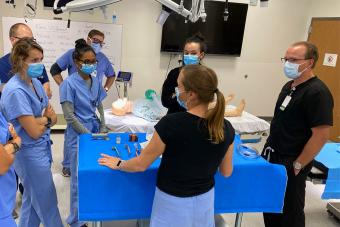The 2025 CASPA application cycle is open April 24 - September 1, 2025.
The Red Rocks Physician Assistant Program is a rigorous 27-month, state-sponsored, nationally accredited program. The program was established in 1998 and has maintained accreditation since inception. The RRCC PA program is the only community college in the US to confer its own master's degree.
Each cohort includes 32 students. Graduates of the RRCC PA program receive a Master’s in Physician Assistant Studies (MPAS). The RRCC PA program has a long history of educating competent, community-minded PAs to practice primary care. Our graduates receive exceptional training and are well-prepared to enter clinical practice upon graduation.
History of the Red Rocks Physician Assistant Program
The Program was created in 1998 after several years of needs assessment and after community support was determined to be strong. The first class was admitted in January of 1999; subsequent classes were admitted in August of each year thereafter beginning in 1999.
Our accepted students have been successful in careers such as nursing, physical therapy, emergency services, exercise physiology, medical assisting, radiographic technology, respiratory therapy, and audiology, among many others. Some students hold a master's or doctoral degree; all have a baccalaureate degree prior to acceptance. Admission to the program is extremely competitive. The average age of each class is between 28 and 30 years old. The RRCC PA Program accepts 32 students per year.
Mission:
The mission of the RRCC PA Program is to prepare physician assistants to serve all communities by practicing professional, empathetic, inclusive, team-based medicine with a focus on primary care and an emphasis on excellence.
Program Goals:
The goals of the RRCC PA program are to:
Train and graduate competent PAs
The success of the program in meeting this goal is demonstrated through:
- A first-time PANCE pass rate comparable to the national average based upon cohort size equivalency
1st Time PANCE pass rate 2023: RRCC - 97%, National data per NCCPA - 92%
Cohort size: RRCC - 31, National data per NCCPA - 45 (average)
Failures per cohort: RRCC - 1, National data per NCCPA - 3.6 - A graduation rate of greater than 90%
In 2023, the RRCC graduation rate was 97%
Promote the development of professionalism and professional identity
The success of the program in meeting this goal is demonstrated through:
- Content and advising designed to teach, monitor, and promote professionalism
- Content and assessment in program courses
- Faculty, preceptor, and community partner panel presentations and Q&A sessions
- Advising forms evaluating professionalism
- Preceptor evaluations assessing professionalism
- In 2023, no student attrition occurred due to professionalism alone
- Produce graduates with professionalism appropriate for the workplace
-In 2023, all graduates passed required professionalism expectations
-Post-graduation survey of class of 2023, 97% of respondents(30 of 31) indicated that the program prepared them for professionalism aspects of healthcare in the workplace.
Deliver a primary care-focused*, team-based curriculum
The success of the program in meeting this goal is demonstrated through:
- Curriculum content taught by organ system with a primary-care focus
- Annual Program review of curriculum - Providing clinical experiences in primary care to include populations across the lifespan
- Annual Program review of clinical curriculum and ongoing student patient logs - A goal of 50% of graduates with an interest in practicing in primary care
- In 2023, 87% of graduates displayed an interest in accepting a job in primary care
- Health services that cover a range of prevention, wellness, and treatment for illnesses seen across the lifespan
Emphasize the underserved/rural practice of medicine
The success of the program in meeting this goal is demonstrated through:
- Delivering content and assessment that examines the challenges and opportunities in underserved/rural medical practice
- Content in program courses- Professional Seminar courses and Advanced Practice Seminar - Providing at least two underserved and/or rural clinical experiences per student
- Met each year with generally up to 4 underserved/rural experiences per student
- In 2022, the program received funding for a rural immersion grant providing extend learning opportunities. Twelve students from the class of 2023 completed the immersion track. - A goal of 30% of graduates with an interest in rural medicine
- In 2023, 81% of graduates displayed an interest in accepting a job in a rural community upon graduation.
Serve the community
The success of the program in meeting this goal is demonstrated through:
- Providing community service opportunities
- Sites such as Community Table and Patterson Elementary health fair - Service to the community as a student portfolio requirement
- Service-learning synopsis to be included in final portfolio for graduation
- 100% of graduates in 2023 met the goal of 6 hours of community service.
Foster a climate of belonging
The success of the program in meeting this goal is demonstrated through:
- The success of the program meeting this goal is demonstrated through:
a. Discouraging cohort competition
b. Faculty availability to all students
c. Provide an opportunity for students to have a graduate mentor of a similar background as a support through the program
d. RRCC resources including affinity groups, Office of Inclusion and Diversity, counseling services, Veteran's support, and Accessibility Services - The success of meeting this goal is demonstrated through an annual Program self-assessment of these aspects
- In 2023, 90% of the graduates felt a sense of belonging
Provide employable PAs for the healthcare workforce
The success of the program in meeting this goal is demonstrated through:
- The expectation that all students meet all clinical and professional standards
